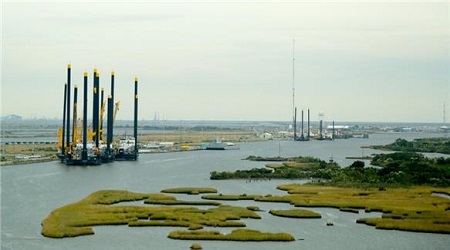This week, a federal judge in New Orleans rejected a lawsuit that sought billions of dollars from energy companies for their role in eroding Louisiana’s coast, which protects the state from flooding by violent storms from the Gulf of Mexico, especially hurricanes. As we look ahead this year toward the ten-year anniversary of Hurricane Katrina (August 2005), in 2015 we reflect on the lingering consequences for people and habitat.
Ten years after Hurricane Katrina, land continues to disappear from under some of the US` first climate refugees. Louisiana pledged $50bn to save the rapidly vanishing coastline, but the state is struggling to find the money.
A series of lawsuits could change that equation and hold the world`s largest oil companies accountable for their role in the environmental crisis.
Meanwhile, Louisiana is a state in the United States whose economy simultaneously depends on the fossil fuel industry and is deeply affected by climate change brought on in part by its activity. Environmental watchdogs say that regulators have fast-tracked approvals for fracking operations in the Gulf of Mexico, accelerating the damage without conducting proper environmental impact assessments.
The following set of articles and videos explore Louisiana`s vanishing habitat and thes state’s ambitious restoration plan, the fate of its coastal communities, and how the offshore fracking boom could impact both.
Other useful references:
Andy Tully, “Judge Dismisses Suit against Energy Companies over Louisiana Erosion” oilprice.com (16 February 2015)
Kevin McGill, “U.S. judge dismisses suit over La. coastal erosion,” Associated Press (14 February 2015)
The Times-Picayune “coastal erosion lawsuit” blog
The Disappearing Delta (Al Jazeera “Faultlines” broadcast)
Louisiana Coastal Land Loss Simulation 1932–2050
The Water Institute of the Gulf
Louisiana Coastal Wetlands: A Resource at Risk (USGS Fact Sheet)
Restore or Retreat, Coastal Erosion: Facts and Figures
Photo: The disappearing delta. Source: Al Jazeera.














